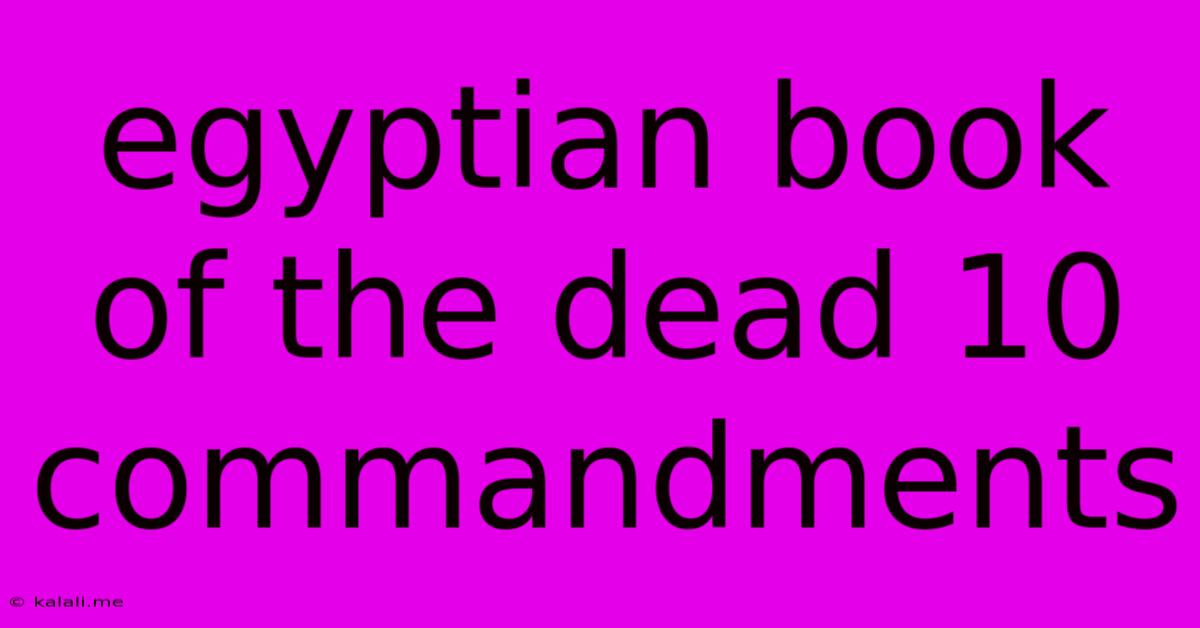Egyptian Book Of The Dead 10 Commandments
Kalali
May 25, 2025 · 3 min read

Table of Contents
The Egyptian Book of the Dead: 10 Commandments (and Beyond)
The "Egyptian Book of the Dead" isn't a single book, but a collection of ancient Egyptian funerary texts. It doesn't contain a concise set of "10 Commandments" like the Judeo-Christian tradition. Instead, it's a complex compendium of spells, hymns, and instructions intended to guide the deceased through the perilous journey into the afterlife. However, we can extract ten core principles or beliefs that represent key commandments for a successful transition, reflecting the overarching moral and ethical framework within the texts. This article explores these principles, providing context and shedding light on the complexities of ancient Egyptian beliefs about death and the afterlife.
Understanding the Book of the Dead: The texts vary considerably depending on the period and the individual for whom they were created. They were personalized, with specific spells and prayers tailored to the deceased's life and aspirations. Think of them as personalized guides to navigating the underworld, rather than a universally accepted moral code.
Ten Guiding Principles from the Book of the Dead:
-
Maintain Ma'at: This is arguably the most crucial commandment. Ma'at represents truth, justice, balance, and cosmic order. Living a life in accordance with Ma'at—being honest, just, and fulfilling one's social duties—is essential for a successful afterlife. Failure to uphold Ma'at could result in a difficult journey or even denial of entry into the afterlife.
-
Confess Your Innocence: Many spells involve a detailed confession of sins, a crucial part of the judgment process before Osiris. Acknowledging and accepting responsibility for one's actions, even minor transgressions, shows a commitment to truth and a willingness to rectify any wrongdoing.
-
Know Your Spells: The spells themselves are powerful tools. Reciting them correctly and understanding their purpose is critical to navigating the underworld's challenges and gaining the favor of the gods. This demonstrates preparation and a respect for the divine.
-
Honor the Gods: Showing piety and reverence towards the gods, particularly Osiris, Anubis, and Thoth, is paramount. Offering prayers, making sacrifices, and understanding their roles in the afterlife journey ensures divine assistance.
-
Respect the Dead: Proper burial rites and honoring ancestors are emphasized. This shows respect for the cyclical nature of life and death and reinforces the interconnectedness of the living and the dead.
-
Uphold Family Duty: Maintaining strong family ties and fulfilling familial responsibilities are vital. This reflects the importance of community and social harmony in both earthly life and the afterlife.
-
Protect Your Ka: The Ka is the life force or spiritual double of an individual. Preserving and strengthening one's Ka is crucial for survival in the afterlife. This involves leading a virtuous life and ensuring proper burial rituals.
-
Preserve Your Name: The preservation of one's name through monuments, tombs, and the Book of the Dead itself was essential for continued existence in the afterlife. Remembering and commemorating the deceased ensures their continued spiritual presence.
-
Master the Weighing of the Heart Ceremony: This ceremony, judged by Anubis and Thoth, is a central aspect of the afterlife journey. The deceased's heart is weighed against the feather of Ma'at. A light heart, representing a righteous life, ensures passage to the Field of Reeds, the Egyptian paradise.
-
Seek the Favour of Osiris: Osiris, the god of the underworld, holds ultimate judgment over the deceased. Gaining his favor is the ultimate goal, securing a blissful existence in the afterlife.
Beyond the Ten: While these ten principles offer a framework, the Book of the Dead is far richer and more nuanced. It explores themes of morality, justice, reincarnation, and the nature of existence itself, offering a complex and fascinating insight into ancient Egyptian beliefs. It's a testament to their sophisticated understanding of death, the afterlife, and the importance of living a life in harmony with the cosmic order.
Latest Posts
Latest Posts
-
Why Do Nuns Cover Their Hair
May 25, 2025
-
Do You Speak Spanish In Spanish
May 25, 2025
-
Mac External Moniter Disconnects Power Settings
May 25, 2025
-
How To Use Schema Visualization In Azure Data Studio
May 25, 2025
-
How Do You Say The In Japanese
May 25, 2025
Related Post
Thank you for visiting our website which covers about Egyptian Book Of The Dead 10 Commandments . We hope the information provided has been useful to you. Feel free to contact us if you have any questions or need further assistance. See you next time and don't miss to bookmark.